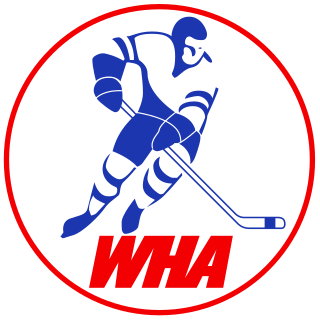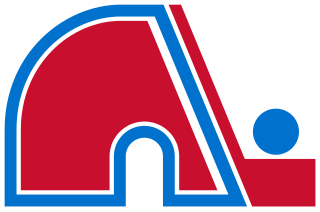Related Research Articles

The World Hockey Association was a professional ice hockey major league that operated in North America from 1972 to 1979. It was the first major league to compete with the National Hockey League (NHL) since the collapse of the Western Hockey League in 1926. Although the WHA was not the first league since that time to attempt to challenge the NHL's supremacy, it was by far the most successful in the modern era.

The Quebec Nordiques were a professional ice hockey team based in Quebec City. The Nordiques played in the World Hockey Association (1972–1979) and the National Hockey League (1979–1995). The franchise was relocated to Denver in May 1995 and renamed the Colorado Avalanche. They played their home games at the Colisée de Québec from 1972 to 1995.

Michel Bernard Goulet is a Canadian former professional ice hockey forward who played for the Birmingham Bulls in the World Hockey Association and the Quebec Nordiques and Chicago Blackhawks in the National Hockey League. He was also a two-time Canada Cup champion with Team Canada. He was inducted into the Hockey Hall of Fame in 1998.
The 1979–80 NHL season was the 63rd season of the National Hockey League. This season saw the addition of four teams from the disbanded World Hockey Association as expansion franchises. The Edmonton Oilers, Winnipeg Jets, New England Whalers, and Quebec Nordiques joined the NHL, bringing the total to 21 teams. The other two WHA teams were paid to fold.
Alain Côté is a Canadian former professional ice hockey player who played for the Quebec Nordiques in the National Hockey League (NHL) and the World Hockey Association (WHA).
The 1978–79 WHA season was the seventh and final season of the World Hockey Association (WHA). Prior to the start of the season, the Houston Aeros folded leaving seven teams to start the season. Only six would finish however, as the Indianapolis Racers folded after 25 games on December 15, 1978. The remaining six teams each played 80 games, including one game each per team against a Soviet All-Star squad and the Czechoslovak National Team, the second consecutive year for this arrangement. The Soviet team won four of their six games and tied another; the Czechoslovak team only won once and tied once against four losses. In addition, because the Racers had folded after playing an odd number of games, the Edmonton Oilers played the Finnish National Team once at home so as to allow each of the six surviving WHA teams to play 80 regular season games. The Oilers won by a score of 8–4, a result which in itself made no difference by the end of the regular season which Edmonton won by an 11–point margin over the Quebec Nordiques.

Joseph Henri Jean-Claude Tremblay was a Canadian professional ice hockey defenceman for the Montreal Canadiens of the National Hockey League (NHL) and the Quebec Nordiques of the World Hockey Association (WHA), notable for play-making and defensive skills.
Richard "King Richard", "Kermit" Brodeur, is a Canadian former professional ice hockey goaltender. Brodeur was born in Longueuil, Quebec and grew up in Montreal, Quebec.
Joseph Gérard Marquis Tardif is a Canadian former professional ice hockey left winger who played in both the National Hockey League (NHL) and the World Hockey Association (WHA), principally for the Quebec Nordiques, and is the all-time leading goal scorer in the WHA.
Réal Cloutier is a Canadian former professional ice hockey player. Cloutier spent five prolific seasons as a winger in the World Hockey Association (WHA) with the Quebec Nordiques. After the WHA folded, he played an additional five seasons in the National Hockey League (NHL), still at a point-a-game scoring pace, with the Quebec Nordiques and the Buffalo Sabres.
Ronald James Chipperfield is a Canadian former professional ice hockey player who served as the Edmonton Oilers' first National Hockey League (NHL) captain. He played for the Oilers in both the World Hockey Association (WHA) and the NHL, as well as the Vancouver Blazers and the Calgary Cowboys of the WHA, and the Quebec Nordiques of the NHL. Chipperfield was born in Brandon, Manitoba.
François Lacombe is a Canadian former professional ice hockey defenceman, who played in the National Hockey League (NHL) and World Hockey Association (WHA) between 1968 and 1980. He spent parts of three seasons in the NHL with the Oakland Seals and Buffalo Sabres before moving to the WHA and playing for the Quebec Nordiques and Calgary Cowboys, playing briefly for the Nordiques again when they joined the NHL.
James Donald Hislop is a Canadian former professional ice hockey forward who played for the Cincinnati Stingers in the World Hockey Association from 1976 to 1979 and then the Quebec Nordiques and Calgary Flames of the National Hockey League (NHL) between 1979 and 1984. He helped the Flames reach the NHL playoff semifinals for the first time in club history in 1981. After his playing career he worked as an assistant coach with the Flames and then as a scout with the Minnesota Wild.
Barry Graham Legge is a Canadian former professional ice hockey player who played 107 games in the National Hockey League and 345 games in the World Hockey Association. He played for the Winnipeg Jets, Quebec Nordiques, Michigan Stags, Baltimore Blades, Denver Spurs, Ottawa Civics, Cleveland Crusaders, Minnesota Fighting Saints, and Cincinnati Stingers.
Gregory A. "Truck" Tebbutt was a Canadian professional ice hockey player. He played 26 games in the National Hockey League with the Quebec Nordiques and Pittsburgh Penguins during the 1979–80 and 1983–84 seasons. The rest of his career, which lasted from 1978 to 1988, was spent in the minor leagues. A defenceman, he was a rugged enforcer in his own end who also put up solid offensive numbers in junior and the minors.
The 1979–80 Winnipeg Jets season was the organization's eighth season since its inception in 1972, and its first season in the National Hockey League.
The 1979–80 Quebec Nordiques season was the Nordiques eighth season overall, however, it marked as their expansion season in the National Hockey League. Quebec had played their previous seven seasons in the now defunct World Hockey Association. In 1978–79, their last season in the WHA, Quebec finished the year with the second best record, as they had a 41–34–5 record, earning 87 points. The Nordiques were then swept by the Winnipeg Jets in the WHA semi-finals. In the NHL, the team finished out of the playoffs.
The 1979 NHL expansion, popularly referred to as the NHL–WHA merger, was the culmination of several years of negotiations between the National Hockey League (NHL) and the World Hockey Association (WHA). The result of the negotiations was that the WHA folded, and four of its six surviving teams - the Edmonton Oilers, New England Whalers, Quebec Nordiques, and Winnipeg Jets – entered the NHL as expansion teams who commenced play in the NHL in the 1979–80 season. The agreement officially took effect on June 22; it ended the seven-year existence of the WHA and re-established the NHL as the sole major league in North American professional ice hockey.

The Battle of Quebec is a former National Hockey League (NHL) rivalry between the Montreal Canadiens and Quebec Nordiques. The rivalry lasted from 1979–80 to 1994–95. The teams played against each other five times in the NHL playoffs, and the Canadiens won three of the series. One meeting in 1984 resulted in the Good Friday Massacre, a game in which multiple brawls happened. The Battle of Quebec extended to politics, in which the Canadiens and Nordiques became symbols for rival parties, and beer distribution, as the teams were both owned by competing breweries.
References
- Biographical information and career statistics from NHL.com , or Eliteprospects.com , or Hockey-Reference.com , or The Internet Hockey Database